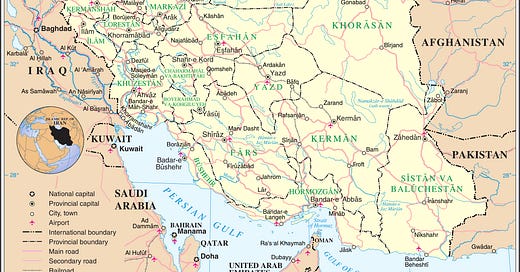Remember these guys?
Editor’s note: The following is a guest post by Thomas E. Ricks.
Putin’s Russia, against all odds, is prevailing in its post-Cold War struggle with the United States. Putin plays a weak hand well; America, under Trump, holds almost all the cards but folds. We slap around our allies, mocking them in speeches and burdening them with tariffs. Except perhaps for being pro-fracking, just about everything Trump does makes life more comfortable for the Russian autocrat. Attack the federal government? Check. Demoralize our military? Check. Try to shut down outlets irksome to Putin, such as Voice of America and Radio Free Europe? Check. (Europe, forced by Trump to chart a different course, may confront Putin in ways he never expected and is poorly equipped to handle.)
But it didn’t occur to me until recently, as I considered news that the U.S. government will this weekend hold high-level discussions with Iran, that Iran too may be winning its long-running skirmish with America. That’s harder to see because Trump still uses bellicose rhetoric against the Islamic Republic. He said late last month, for example, "If they don't make a deal, there will be bombing. It will be bombing the likes of which they have never seen before."
But this is almost certainly standard Trump bravado. If Trump were serious he would operate very differently. He’d beef up the U.S. military, making sure that it had high morale and competent leaders. Instead, he installs the buffoon Pete Hegseth as defense secretary; he talks about cutting the size of the Army; and he fires his top cybercommander for no good reason.
Trump’s signature military initiative is to eliminate all aspects of “DEI,” which in practice means making white supremacists feel more comfortable. In addition, Trump is eroding the human and intellectual capital of our armed forces, cutting programs such as professional military education and the Office of Net Assessment (an internal Pentagon think tank), both essential to keeping a peacetime military on its toes. Rigorous professional military schools produced such stellar commanders for World War II as George Marshall, Dwight Eisenhower and Omar Bradley; promotion without any professional education led to William Westmoreland, who was unable to think strategically and so became a key architect of our defeat in Vietnam.
Iran is no longer a priority for the United States. It will get some lip service from the Oval Office, but no serious attention or preparation. If Trump’s threatened bombing ever comes to pass, it likely will be a rap on the knuckles, only enough to set back Iranian military capabilities a year or two. To this bizarre administration, Iran is a back-seat matter, well behind Greenland and Canada.
Trumpism is not what Tehran expected, but it is what it planned for. That is, Iran’s long-range strategy has been to exhaust American interest in intervening in the Middle East, eventually making it curtail its ambitions and let Iran have its own way as a regional power. Iran certainly suffered setbacks lately in Syria and Lebanon, with its proxies taking a beating. But in the long run it appears to be doing better in the region than the United States. Imagine the comfort Tehran can take as it sizes up people like Trump, Hegseth, Vice President J.D. Vance, and U.S. intelligence director Tulsi Gabbard—and most of all, Trump’s ruinous plans for the U.S. economy.
So I expect that Trump’s thunderous rhetoric with Iran will blow over, leaving behind a quiet accommodation of the kind he has reached with the Taliban in recent weeks.






Just saw one more bit of evidence: https://www.axios.com/2025/04/11/gabbard-iran-ruger-trump-intel-briefing
And more: https://foreignpolicy.com/2025/05/16/trump-middle-east-trip-iran-us-foreign-policy/